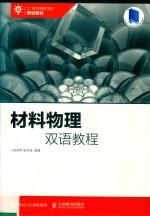图书介绍
材料物理双语教程【2025|PDF下载-Epub版本|mobi电子书|kindle百度云盘下载】

- 密保秀,高志强编著 著
- 出版社: 北京:人民邮电出版社
- ISBN:9787115457882
- 出版时间:2018
- 标注页数:388页
- 文件大小:44MB
- 文件页数:398页
- 主题词:材料科学-物理学-高等学校-教材-汉、英
PDF下载
下载说明
材料物理双语教程PDF格式电子书版下载
下载的文件为RAR压缩包。需要使用解压软件进行解压得到PDF格式图书。建议使用BT下载工具Free Download Manager进行下载,简称FDM(免费,没有广告,支持多平台)。本站资源全部打包为BT种子。所以需要使用专业的BT下载软件进行下载。如BitComet qBittorrent uTorrent等BT下载工具。迅雷目前由于本站不是热门资源。不推荐使用!后期资源热门了。安装了迅雷也可以迅雷进行下载!
(文件页数 要大于 标注页数,上中下等多册电子书除外)
注意:本站所有压缩包均有解压码: 点击下载压缩包解压工具
图书目录
Chapter 1 Introduction1
1.1Definition of Material2
1.2 Family of Materials3
1.3 Brief History of Material Development3
1.4 Material Physics and Other Related Science7
1.5 Importance of Material Science9
Vocabulary10
Problems13
Chapter 2 Basic Structure and Organization of Atoms in a Material15
2.1 Bonding Modes Among Atoms16
2.2 Crystal Structure21
2.2.1 Unit Cells,Space Lattices and Lattice Point22
2.2.2 Crystal Systems26
2.2.3 Representative Parameters for Crystal Systems30
2.2.4 Crystal Structures of Metals and Organic Materials36
2.3 Crystal Defects39
2.4 Nanocrystalline Structures45
2.5 Amorphous Structures46
Vocabulary49
Problems51
Chapter 3 Fundamentals of Electron Theory53
3.1 Introduction54
3.2 Wave Particle Duality and Quantum Mechanics54
3.3 Wave Function and Schrodinger Equation58
3.4 Classical and Quantum Statistics62
3.5 Free Electron Theory of Metals65
3.6 Band Theory of Solids79
3.6.1 Schrodinger Equation and Its Solution Under near Free Electron Approximation79
3.6.2 Bandgap80
3.6.3 Interpretation of Conductivity82
3.6.4 Brillouin Zone Under Near Free Electron Approximate84
3.6.5 State Density under Band Theory85
3.6.6 Effective Electron Mass as a Function of k86
Vocabulary88
Problems90
Chapter 4 Solid State Phase Transformation93
4.1 Concepts94
4.2 Features of Solid State Phase Transformation99
4.2.1 General Procedure99
4.2.2 Phase Interface99
4.2.3 Orientation Relationship100
4.2.4 Habit Plane100
4.2.5 Strain Energy101
4.2.6 Influence of Defects102
4.2.7 Atom Diffusion102
4.3 Classification of Solid State Phase Transformation103
4.3.1 Classification Based on Thermodynamics103
4.3.2 Classification Based on Atomic Diffusion105
4.4 Polycrystalline Transformation105
4.5 Eutectoid Transformation108
4.5.1 Thermodynamics of Eutectoid Transformation108
4.5.2 Processes in Eutectoid Transformation109
4.5.3 Dynamic Characteristics: TTT Curve112
4.6 Austenite-Martensite Transformation112
4.6.1 Historical Remark112
4.6.2 Features of Martensitic Transformation113
4.6.3 Dynamic Process115
4.6.4 Shapes of Martensite118
4.6.5 The Mechanism of Martensite Formation119
4.6.6 Thermoelastic Martensite and Shape Memory Effect121
4.7 Glass Transition123
Vocabulary126
Problems128
Chapter 5 Mechanical Properties131
5.1 Significance of Material Mechanical Properties132
5.2 Basic Concepts in Mechanics133
5.3 Elastic Deformation146
5.4 Plastic Deformation147
5.5 Creep and Stress Relaxation156
5.6 Fracture and Fatigue159
Vocabulary162
Problems164
Chapter 6 Electrical Properties165
6.1 Basic Concepts for Electricity166
6.1.1 Ohm’s Law166
6.1.2 Conductivity167
6.1.3 Mean Free Path169
6.1.4 Materials with Different Electrical Properties169
6.2 Conductor171
6.2.1 Metal Conductor171
6.2.2 Transparent Conducting Oxide (TCO)179
6.3 Semiconductor182
6.3.1 Inorganic Semiconductor183
6.3.2 Organic Semiconductor197
6.3.3 Application of Semiconductor201
6.4 Superconductor206
6.4.1 Phenomenon and Definition206
6.4.2 Meissner Effect209
6.4.3 Critical Magnetic Field211
6.4.4 Critical Current Density (Jc)212
6.4.5 Thermal Dynamic Features213
6.4.6 Classification of Superconductor218
6.4.7 Theory about Superconducting220
6.4.8 Tunnelling/Josephson Effect225
6.4.9 Applications of Superconductor228
6.5 Dielectric Material232
6.5.1 What is Dielectric Material232
6.5.2 Characterization233
6.5.3 Polarization Mechanism235
6.5.4 Complex Dielectric Constant and Dielectric Loss240
6.5.5 Dielectric Breakdown245
6.6 Thermoelectricity of Material247
6.6.1 Thermoelectric Potential and Absolute Thermoelectric Coefficient247
6.6.2 Classification248
6.6.3 Applications249
Vocabulary254
Problems259
Chapter 7 Magnetic Properties263
7.1 Introduction264
7.2 Characterization and Principles for Magnetism265
7.2.1 Magnetic Field Intensity and Magnetic Force—Macroscopic Approach265
7.2.2 Magnetic Dipole,Magnetic Moment and Magnetization—Microscopic Approach266
7.2.3 Magnetic Inductance,Permeability and Magnetic Susceptibility272
7.2.4 Magnetism Classification274
7.3 Features of Ferromagnetic Materials284
7.3.1 Curie Point284
7.3.2 Order-Disorder Transformations285
7.3.3 Magnetic Domain286
7.3.4 Features of Ferromagnetic Materials in Magnetic Fields288
7.4 Functional Magnetic Materials292
Vocabulary298
Problems299
Chapter 8 Optical Properties301
8.1 Light302
8.1.1 History of Optical Science302
8.1.2 Light Wave-Electromagnetic Wave304
8.2 Interaction of Light with Materials306
8.2.1 Macro Phenomena306
8.2.2 Mechanisms307
8.3 Optical Property of Materials324
8.3.1 Metals324
8.3.2 Nonmetals325
8.4 Applications of Optical Materials334
8.4.1 Optical Fibers in Communications334
8.4.2 Plastic Optics338
8.4.3 Luminescent Materials (Inorganic Only)346
Vocabulary348
Problems349
Chapter 9 Thermal Properties351
9.1 Heat Capacity352
9.1.1 Definition352
9.1.2 Classical Model (Dulong-Petit Law)353
9.1.3 Einstein Model355
9.1.4 Debye Model358
9.1.5 Comparison of Models362
9.1.6 Heat Capacity in Real Materials364
9.2 Thermal Conductivity365
9.2.1 Thermal Conductivity and Thermal Diffusivity365
9.2.2 Mechanism for Heat Conduction367
9.2.3 Thermal Conduction in Real Materials371
9.3 Thermal Expansion377
9.3.1 Length and Volume Thermal Expansions377
9.3.2 Theory for Thermal Expansion379
9.3.3 Thermal Expansion and Heat Capacity381
9.3.4 Thermal Expansion and Melting Point382
9.4 Thermal Stability and Thermal Shock382
Vocabulary385
Problems386
参考文献388
热门推荐
- 2597569.html
- 2654422.html
- 3572430.html
- 1980686.html
- 102234.html
- 3704179.html
- 948720.html
- 2427851.html
- 1427618.html
- 236980.html
- http://www.ickdjs.cc/book_3233312.html
- http://www.ickdjs.cc/book_3227556.html
- http://www.ickdjs.cc/book_2112066.html
- http://www.ickdjs.cc/book_3048520.html
- http://www.ickdjs.cc/book_1565121.html
- http://www.ickdjs.cc/book_1191907.html
- http://www.ickdjs.cc/book_3112135.html
- http://www.ickdjs.cc/book_3572704.html
- http://www.ickdjs.cc/book_2348704.html
- http://www.ickdjs.cc/book_156915.html